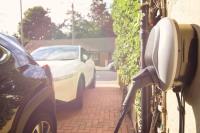 Add My Company
Add My Company
Sign In
The Cheap EV Myth
20-02-2023

Busting the Myth that you can get a Cheap EV Car Charger
The things I hear sometimes on a daily basis.
Stop believing the standard marketing ploy of EV chargers “from”, this basically means it is the most basic charger normally the cheapest version of a charger this does not mean it can be installed for that cost, installation is extra, and it all comes with plus VAT.
Chargers come in all shapes and sizes the purpose of this article is to lay this out I’m going to basically talk about a domestic charger there are multiple charges on the market ranging from: –
A Type 2 portable EV charger 6- 13 A basically you plug into a 13 amp socket and it will charge your hybrid car however the socket that it plugs into needs to be capable of dealing with the amount of heat produced by an EV charger, a standard 13 amp socket will eventually overheat char and catch fire you can buy them yourself off a website for at present between hundred and £80 and £200 including VAT this will normally charge a small hybrid battery normally take upwards of a hundred minutes to charge.
A Type II EV wall charger up to 7.4 kW (an example of a charger average cost @ Feb 2023 £ 680+ depending on features) can range, anywhere from £450 plus VAT for a very basic charger at present to £1,300 or £1,400 for chargers (different makes are different costs) with all the bells and whistles such as load management, Wi-Fi connection, solar capabilities, battery capabilities and this is just for the charger, this does not include the installation cost much to the surprise of many people.
Let us breakdown down the anatomy of an EV charger and its true costs.
Many companies just give a cost and suddenly there are additional costs and you already agreed to the contract avoided people like this, like the plague this is my personal opinion.
The first thing a truly competent installer will do is ask to come out and do an assessment to see if your system can actually take the EV charger this involves a site visit which is costing the contractor about 4-5 hours inclusive of travel.
During this visit he will be assessing the route the length of the cable, taking measurements, the type of fuse board protection you’ve got and so many other variables this is then taken back to the office and a design assessment is then taken, this can take another 1-2 hours.
So, before they get the job, they will have carried out anywhere between 4 to 7 hours of work believe me this will get recouped within the price or part of it, you do not, get something for nothing, this is a fallacy that so many people on the Internet believe, no installation should ever be done without checking the design parameters failure to do so could end up with a major fire.
Some installations are easy literally through the wall, from your fuse board either way they may require new fuse board installation and a double poll isolator by the metering company before any work can be carried out, this all costs more money than the EV charger “from” price seen all over the Internet.
Prior to even installing the work your contractor needs permission from your DNO to install the charger onto the network this can take 24 hours or 4 to 5 weeks depending on your DNO and the number of times I get Screamed at despite explaining this to clients at the outset, it’s not in our control.
We cannot install this onto the electrical system without prior agreement in writing from the DNO this is totally out of our control, once applied for, all we can do is go back to them and ask why it hasn’t come through.
Some fuse boards have the ability to put an additional type Double pole Type A RCBO in order to feed your new EV charger some do not, and some are incapable of having this facility because of the setup that exists which is why sometimes you require a new fuse board for your safety which is paramount to a competent contractor; cowboys don’t care and will often try and install systems without any of the safety features, I see this in so many EV installations but they were cheap & dangerouse!
Depending on the type of EV charger you choose and the distance away from the supply plus whether you need a new fuse board or whether the unit comes with a tethered lead can dramatically affect the cost of the installation.
So, let’s start on the basis that your fuse board cannot incorporate this into its existing structure.
Do you have a double pole isolator if you do, we can isolate the supply and start adding in a small additional board as long as you have the space for it if you don’t you might be talking about a weatherproof board which is more expensive, please bear in mind as previously stated chargers ranging £300 – £1,400 not inclusive of VAT, an additional fuse board will cost more money.
Many of the very cheap chargers that are possible to buy on the open market do not include a surge protection safety device that protects your investment in the equipment from surges, they also do not include O-pen safety devices which protects you from getting electrocuted depending on the type of supply system you have, they are not Wi-Fi enabled which is a requirement we cannot fit an EV charger that is not Wi-Fi capable it is a legal requirement all of this makes the charges very cheap, except they’re not compliant.
Caveat emptor is a Latin phrase that means “let the buyer beware.
I regularly fail, over 90% of all the charges that have been installed incorrectly even the government has written twice in the past few years to every approved EV installer registered on their books regarding the appalling level of installation that they are seeing, and many contractors have been removed leaving behind a minefield bad/dangerous installations.
That’s just break this down for you so you can see what’s involved.
Double pole isolator from DNO (anywhere from £90 -120 depending on your DNO) this is an additional cost which requires documentation to be filled out on your behalf this can take up to 30 minutes depending on the complexity of the DNO’s system.
Possible new fuse board if separate you could be looking anywhere between £250-300 plus VAT just to buy this, installation is extra.
Cost of a compliant EV charger will be anywhere from £450-£1400 depending on the features, Wi-Fi compatibility legal requirement must have, and load balancing best to have this in domestic installations so you don’t end up with blowing up the supply head fuse, solar capabilities to charge from your solar cells on the roof, not all charges have this, does it have battery storage capabilities, so if you have your own battery storage being supplied from your solar this can be utilised to charger EV again not included in all charger, this is an additional cost, however not including these features considering where society is now heading towards prosumers will require you to throw away your basic charger and install a new one plus the control cables because you didn’t run them in the first place because you chose the cheapest option, beware cheapest is never the best, this is why competent installers ask you if you are ever thinking of going in that direction as this changes the type of charger that will be installed, all of these features increase the cost of your charger.
Do you want the charger to come with a tethered lead or without depending on the lead length will increase the cost of your charger or anywhere from £100 to £200 Plus VAT on top of the charger, as leads come from as little as 3 m to 10 m long.
Site visit
Cost the contractor around £320 gets recouped
DNO approval
Cost the contractor around £30 gets recouped
The design of the system
Cost the contractor around £50-100 gets recouped
Double pole isolator
The cost, to the customer, is around £97 – £120
Option 1. Small additional fuse board
The cost, to the customer, is around £350-£400 installed.
Option 2. Replacement of your existing fuse board if this is the only option. Anywhere from £600 – £ 1000 depending on how many fuses you have
The cost of the charger with all the safety features is part of the cost of a safe system.
Such as type A RCBO at the origin, an O-pen safety device and so much more inclusive of the installation.
Cost to the customer is anywhere from £1600 – £1.800 Plus VAT installed (e.g., install right next to the fuse board charger directly through the wall less than 3-5 m run, for a small board.
Or 30+ metres run through a property inside Cornice trunking to hide it, fire stopping two or three holes run around the garden fence up to the charger install, then a full test inspection upon completion from around £2,600 all plus VAT depending on how long the run is.
So, before you start looking at this please realise what’s involved this is an expensive investment that needs to be done right and not have to be pulled out and started again because you’re convinced the cheapest option was the best way (because that was how the marketing was done to draw you in) the fact that all these variables exist should teach you to ask questions please stop believing EV chargers “from” all they are talking about is the cost of the charger the installation is always on top and this is variable on every installation due to what you have in your property, or how far away it is.
When you start talking about commercial units these costs are exponentially more expensive three-phase units are not only far more costly the safety features required to ensure you do not get electrocuted are considerably higher.
If you would like to talk to us, we can assess your situation and we will ask a lot of questions to make sure that the design & installation is done safely & correctly the prices shown above are good variable costs from next door to the fuse board 3 meters to 30 m runs as of February 2023
if you come to us, we will just tell you the truth and it will be installed correctly and safely to protect you and anyone else that comes anywhere near your car or the charger whilst is running/plugged in.
For more information on The Cheap EV Myth talk to Safe Electric Nationwide Ltd
Enquire Now
More News
List your company on FindTheNeedle.
